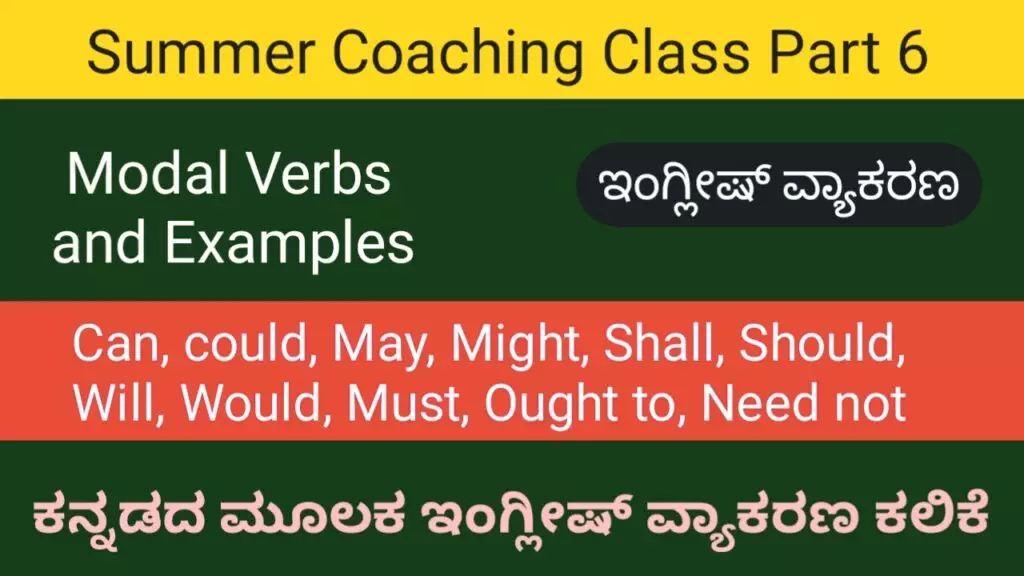Modal verbs in English grammar. List of modals in English grammar with examples. Modals examples sentence with answers.
A modal verb is a kind of auxiliary verb that is used to express modalities (the states or ‘modes’ in which a thing exists) such as possibility, ability, prohibition and necessity. Some common examples of modal verbs include should, must, will, might and could.

To get more grammar videos, visit our YouTube channel. This channel is very useful for all competitive exam reparation.
Click to download Modal verbs in English grammar
Watch this video for the explanation of Modal verbs in English grammar.
modals in english grammar with examples
What Are Modal Verbs?
Modals are the verbs in English grammar that show necessity, intent, possibility, or ability. Because they are a type of auxiliary verb which is a helper verb, they are used jointly in a sentence with the main verb.
List of Modal Verbs
can, could, may, might, will, would, shall, should, must, dare, ought to, had better, and need not.
Use of Modal Verbs:
Modal verbs are used to express functions such as:
Permission, Ability, Obligation, Prohibition, Lack of necessity, Advice, possibility, probability.
1. ‘Can’ usually expresses ability or capacity, permission
Example:
Raju can swim across the river.
Can you lift this car?
You can go now.
She can speak Kannada very well.
2. ‘May’ is used to express permission or possibility.
Example:
Sudha may become the football player.
You may come in.
May I leave the room now?
It may rain tomorrow.
3. ‘Could’ and ‘might’ are used as past forms of ‘can’ and ‘may’ respectively.
Example:
I could swim across the river when I was young.
Ram couldn’t run when I was a baby.
I thought he might be at home.
Might we go to the park this morning.
4. ‘Shall’ and ‘will’ used to denote future action.
Example:
I shall need the money tomorrow.
When will you come next?
Will you keep your voice down?
5. ‘Should’ and ‘would’ are used as past forms of ‘shall’ and ‘will’ respectively.
Example:
I expected that I would get a first class.
She would sit for hours listening to the radio.
We should obey the laws.
You should keep your promise.
modals in english grammar exercises
6. ‘Must’ is used to express necessity and obligation
You must improve your spelling.
We must follow the law.
You must wear warm clothes when you go outside.
Pupils must not run in the corridors.
7. ‘Ought to’ is used to express moral obligation and is stronger than both ‘should’ and ‘must’.
Example:
We ought to love our parents.
The book ought to be very useful.
ou ought to listen carefully.
We ought to leave now.
Lucy ought to go by herself.
8. “had better” is used to express that they think something is a good (or a bad) idea.
I had (or I’d) better sleep now.
You’d better discuss this issue with Bruno.
We’d better leave before the police come.
He’d better not come.
9. “need not”: to show that something is not necessary OR to express necessity or requirements that we need
You need not wait for him.
He need not worry about the money.
He needs to go to the supermarket.
Silvia needs to buy a new car.
Modal verbs for competitive exams:
This comprehensive guide on modal verbs in English grammar serves as an essential resource for learners and educators alike. Modal verbs, which include can, could, may, might, must, shall, should, will, and would, play a crucial role in expressing ability, possibility, permission, and obligation. Understanding these verbs enhances communication skills and grammatical accuracy.
The product features a detailed list of modal verbs accompanied by clear examples to illustrate their usage in various contexts. This approach not only aids in comprehension but also provides practical applications for everyday conversation and writing.
Additionally, the guide includes answers to example sentences, allowing users to verify their understanding and application of modal verbs. This interactive element fosters a deeper grasp of the material, making it an invaluable tool for both self-study and classroom instruction. Enhance your English proficiency with this essential guide to modal verbs.
